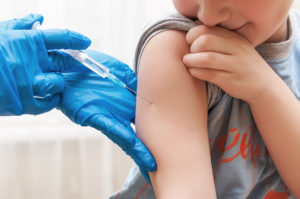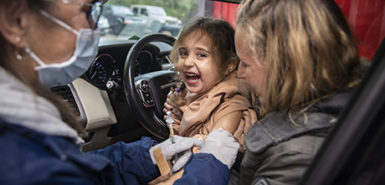
Be sure to put vaccinations on your children’s back-to-school lists, whether they’re just starting school or heading off to college, experts say.
By protecting infants, children and teens from serious diseases, vaccinations also protect families, schools and communities.
“The best way to treat diseases is to prevent them in the first place, and the diseases on the vaccine schedule are all preventable for the vast majority of our population,” said David Kimberlin, vice chair of pediatrics at the University of Alabama at Birmingham.
Our Take
Outbreaks get close to home
Kathy Maine, chief compliance officer at Spectrum Health Medical Group, has worked closely with Spectrum Health’s physicians and employees to publicize vaccination waiver changes.
“The No. 1 concern for health care providers and the state department of community health is that parents have good information on which to base their decisions,” Maine said. “That’s really the reason waivers are now granted the way they are. The state is stepping in and saying, ‘We really need to make sure we’re providing good information to families.’”
It’s not about racking up immunizations for the sake of numbers; it’s about preventing disease.
“It was a wakeup call when the measles outbreak occurred at Disney,” Maine said. “There was this realization that, ‘Oh, my gosh, there’s a whole world out there outside schools and day cares that we should be worried about.’
“Nothing is that local anymore,” she said. “Things spread really quickly. If 90 people are exposed to something and they went off to 30 or 40 different places when they went home, you just look at the level of potential exposure out there.”
Bob Swanson, immunization division director at the Michigan Department of Health and Human Services adds: “In the world we live in now, we’re only a plane ride away from where some of these vaccine-preventable diseases are still endemic. Places where they routinely see measles, or they routinely see polio. It only takes one plane ride to reintroduce these into society here.”
“If we don’t ensure that the greater number in our population are vaccinated, we’re going to see those outbreaks start again,” Swanson added. “With the health care we have, there’s no reason for that. We can prevent that. We need to do the best job we can to ensure all kids are vaccinated.”
“The scientific evidence and public health statistics are comprehensive and compelling—properly scheduled and dosed vaccines are safe and effective, and they’re the reason we don’t see diseases like measles or whooping cough running rampant across our country,” Kimberlin said in a university news release.
Kimberlin is the American Academy of Pediatrics’ liaison to the U.S. Centers for Disease Control and Prevention’s advisory committee on immunization practices.
Immunization requirements vary by state. All have a minimum requirement for dosing each school year to attend public schools. Many require an updated immunization certificate before a child enters any public school or child care center.
Here’s what else you should know:
- All 50 states and the District of Columbia require vaccinations for diphtheria, tetanus and pertussis, polio, measles and rubella.
- 49 states and D.C. also require mumps vaccination.
- 48 states and D.C. require varicella (chickenpox) vaccination. (Montana and Pennsylvania do not).
- 45 states and D.C. require hepatitis B vaccination to enter kindergarten. (Alabama, Maine, Montana, North Dakota and South Dakota do not).
- Some states require Hib (Haemophilus Influenzae Type b); PCV (pneumococcal); flu and hepatitits A vaccines to enter kindergarten.
Insurance covers school vaccinations. If you don’t have insurance, your state health department can direct you to services that offer low-cost and/or free immunizations, said Dr. Rachael Lee, an assistant professor in the university’s division of infectious diseases.
Vaccinations are available at doctor offices, pharmacies, health centers and local health departments.
College students require specific vaccinations and should check with their school to learn which ones they need, university experts said.
Life-threatening infections such as meningococcal disease are more common among college-age people, but can be prevented through full vaccination, the experts said.
 /a>
/a>
 /a>
/a>
 /a>
/a>